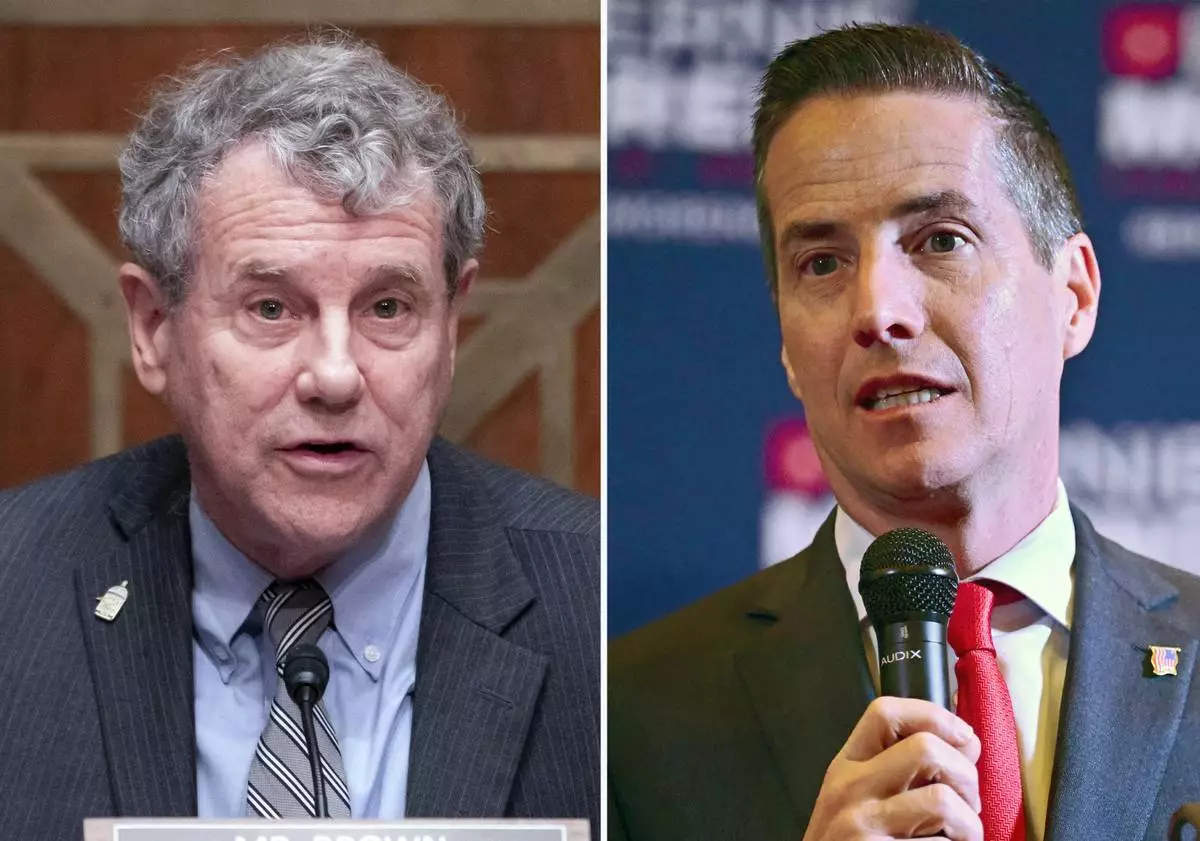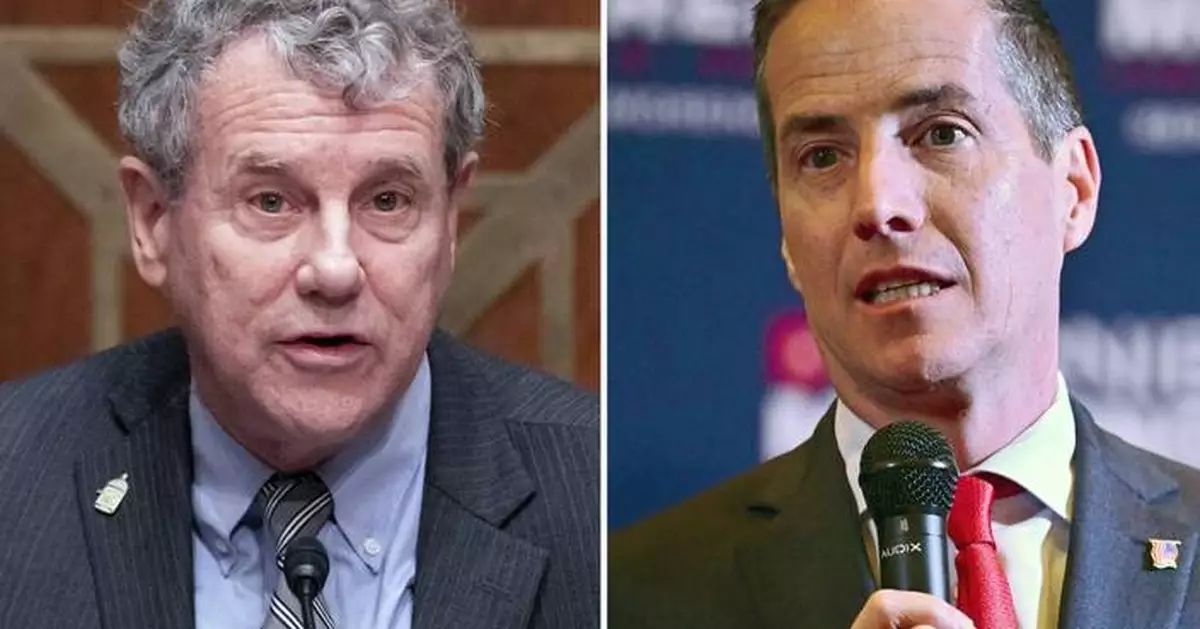COLUMBUS, Ohio (AP) — An off-the-cuff comment about reproductive rights by Republican Bernie Moreno in Ohio’s tight Senate race has put abortion at the center of debate in the most expensive Senate campaign this year. And that’s just where Democratic Sen. Sherrod Brown wanted it.
Moreno insists he was joking after cellphone video surfaced of him criticizing women whose votes are driven by concerns about government involvement in abortion decisions.
“Sadly, by the way, there’s a lot of suburban women, a lot of suburban women that are like, ‘Listen, abortion is it,’” Moreno said at a town hall in Warren County on Sept. 20. ”‘If I can’t have an abortion in this country whenever I want, I will vote for anybody else.’ OK. It’s a little crazy, by the way, but — especially for women who are like past 50, I’m thinking to myself, ‘I don’t think that’s an issue for you.’”
Brown and his allies pounced on the comment, which went to the heart of the Democrat's bid for a fourth term representing the Republican-leaning state. A woman featured in one TV ad wondered why, if a 50-year-old woman doesn't have standing to feel strongly about abortion, a 57-year-old man — that's Moreno's age — running for Senate would.
Even fellow Republican Nikki Haley, the former presidential candidate, criticized Moreno as #ToneDeaf. "Are you trying to lose the election? Asking for a friend,” she quipped on X.
Brown has made access to abortion a priority, and Moreno's comment meant the campaign was focused less on the economy and immigration, issues the Republican and his party would rather talk about.
Throughout the race, Brown has said he voted for and would honor an amendment that Ohioans supported by wide margins last year that enshrined into the state constitution people's right to make their own reproductive choices. Presidential nominee Kamala Harris and Democrats on down the ballot are banking on the abortion issue to win votes in the first White House election since the U.S. Supreme Court overturned Roe v. Wade in 2022.
“The people of Ohio think women should have the power to make their own health care decisions, Bernie Moreno thinks he should,” Brown said in a statement. “As a man over the age of 50, I care deeply about a woman’s right to make health care decisions for herself -– for my daughters, my granddaughters, and all Ohio women, regardless of their age.”
Unseating Brown is a Republican priority. With Democrats defending twice as many Senate seats as Republicans, a loss in Ohio would jeopardize Democrats' narrow majority.
Ad spending topped $400 million in early October, making the Senate race the most expensive in the country so far, according to data from AdImpact, which tracks campaign spending on advertising. That total includes a competitive Republican primary earlier this year.
In the general election, the data shows Republicans have outspent Democrats on Brown-Moreno race. As of Friday, Republicans had spent roughly $188.4 million on ads since the March 19 primary, compared with $159.7 million by Democrats. The parties and affiliated groups have an additional $68.5 million in ad spots reserved between now and Nov. 5.
Moreno, a wealthy Cleveland businessman endorsed by Donald Trump — was undeterred by the controversy that ensued after his abortion comments surfaced. His campaign said the comment was made tongue in cheek, and that Brown and Harris are the ones disrespecting women.
“Bernie’s view is that women voters care just as much about the economy, rising prices, crime, and our open southern border as male voters do, and it’s disgusting that Democrats and their friends in the left-wing media constantly treat all women as if they’re automatically single-issue voters on abortion who don’t have other concerns that they vote on,” spokesperson Reagan McCarthy said in a statement.
Ohio Republicans have plenty of reasons to be optimistic about the race. The onetime bellwether state has shifted to the right and supported Trump twice by wide margins, and he's once more atop the ticket.
Trump's endorsement has carried weight in Ohio — from JD Vance, the first-term senator who is Trump's running mate, to GOP state Rep. Derek Merrin, who prevailed in a messy primary to challenge Marcy Kaptur, a long-serving Democratic congresswoman. Trump's backing boosted Moreno to victory in a hard-fought primary.
Republicans have hammered Brown on his record, claiming he voted to allow “biological men in women’s sports” and supported providing stimulus checks and federal benefits for immigrants who are in the United States illegally. Both claims stretch the truth: Brown didn't vote to allow transgender people to play women's sports but to prevent federal dollars from being stripped from schools that allowed it, and the immigrant-related vote in question involved a nuanced issue in legislation that already prevented stimulus checks going to immigrants without lawful status in the country.
Still, the attacks have been repeated often enough to register with voters.
“Bernie Moreno has rapidly closed the gap on Sherrod Brown even as Chuck Schumer and DC Democrats spend millions lobbing baseless smears and racist attacks at Moreno,” National Republian Senatorial Committee spokesperson Philip Letsou said in a statement. The reference was to pro-Brown ads questioning the business dealings of some family members of Moreno, who was born in Bogota, Colombia.
Senate Majority PAC, an independent group aligned with Senate Majority Leader Chuck Schumer of New York, reserved $65 million in advertising time in Ohio from Labor Day to the end of the campaign. The group's president, JB Poersch, said Brown's reputation, strong campaign and superior fundraising prowess will help put the veteran politician over the top.
“We have a pretty big communication advantage in that state,” he said.
More than 90% of Republican spending — all but $1.9 million of Moreno's ad support — has come from outside groups, according to AdImpact data.
Brown has raised $51 million for his own campaign account, compared with Moreno's $15.3 million, which includes $4.5 million Moreno loaned to his own campaign. The Republican has reported spending about $10 million of that so far, with his latest campaign finance report not yet filed.
Republicans are expected to keep tying Brown to the Biden-Harris administration's immigration policy, a key vulnerability this year for Democrats.
When it came to the turmoil in Springfield, Ohio, Moreno tried to blame Brown and Harris, slamming the “Haitian invasion” as a failure of the federal government to prepare before expanding the number of Haitians able to apply for Temporary Protected Status in the United States.
Brown did not name Trump and Vance, who intensified the spotlight on the city with unsubstantiated claims about Haitians eating pets, but he faulted “people playing politics” for making things worse. At one point, state and local government offices and schools in Springfield closed due to dozens of bomb threats.
Moreno, meanwhile, has faced other challenges, including an Associated Press report about a profile created with Moreno’s email account on an adult website. Moreno's lawyer said the profile was created by a former intern as a prank.
The candidate retained support from Trump after the report and was given a coveted speaking spot at the Republican National Convention in July.

U.S. Sen. Sherrod Brown, D-Ohio, speaks with supporters at a campaign rally, Saturday, Oct. 5, 2024, in Cincinnati. (AP Photo/Jeff Dean)

This combination photo shows Sen. Sherrod Brown, D-Ohio, Oct. 26, 2023, on Capitol Hill in Washington, left, and Cleveland businessman Bernie Moreno, a Republican candidate for Senate, in Westlake, Ohio, March 19, 2024. (AP Photo)










